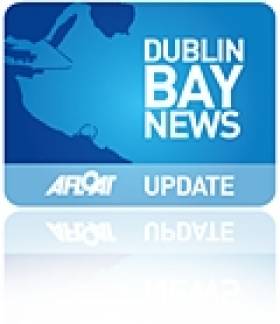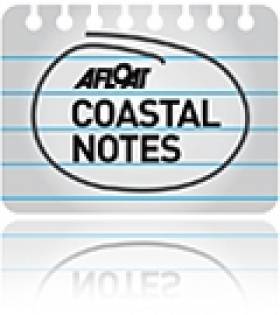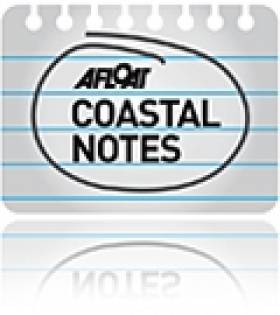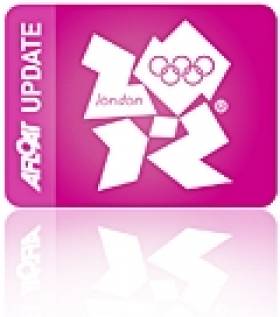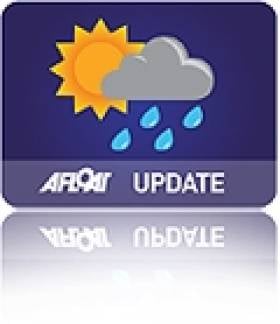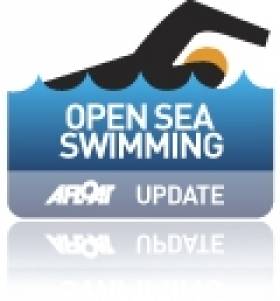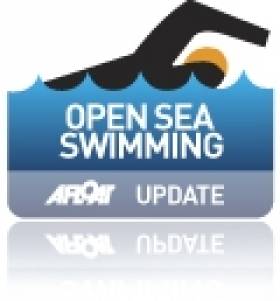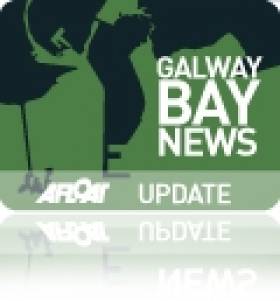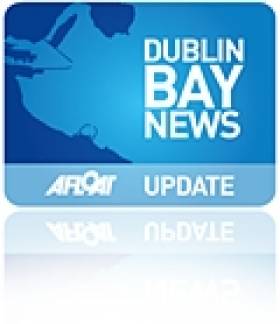Displaying items by tag: swimming
Forty Foot Swimming Club Maintains Ban on Women
#FORTY FOOT - The Irish Times reports that a men-only bathing club at the famous Forty Foot swimming spot in Sandycove, south Dublin, has voted against a proposal to allow women members.
While the area is open for all - and has allowed both sexes for more than 25 years - the adjacent clubhouse and changing hut are owned by the Sandycove Bathers' Association, founded in the late 19th century.
The Dublin Bay club does not grant full membership to women, though many do contribute an annual maintenance fee.
At a meeting on Thursday to discuss the proposed motion - rejected by a vote of 24 to 17 - one unnamed member described what he perceived as "an underlying tone of misogyny".
The Irish Times has more on the story HERE.
Cork Beach Bathing Ban Lifted as E.coli Levels Drop 'Significantly'
#COASTAL NOTES - The bathing ban imposed last week on seven Cork coastal beaches has been lifted, according to RTÉ News.
As previously reported on Afloat.ie, the seven beaches had been closed to swimming over concerns at elevated E.coli levels in the water, resulting from water runoff after the recent heavy rainfall in the county.
Cork County Council took the decision to lift restrictions after tests this week showed E.coli levels had "significantly descreaed" below the EU mandatory safety level.
The seven affected beaches included three in the Youghal area. Redbarn at Youghal joins Garretsown near Kinsale and Garryvoe in the beaches that can fly their Blue Flags once more.
Cork Beach Closures Continue as E.coli Results Awaited
#COASTAL NOTES - Cork County Council has announced it will be at least two more days before it knows if its bathing ban at seven beaches can be lifted, according to RTÉ News.
As previously reported on Afloat.ie, the seven coastal beaches - including blue flag strands at Garretstown, Redbarn and Garryvoe - have been closed to swimming over concerns at elevated E.coli levels in the water, resuling from water runoff after the recent heavy rainfall in the county.
Notices were first posted by the council last Friday, and the latest water samples were collected at the affected beaches yesterday.
Youghal is the worst affected by the outbreak, with three beaches closed.
Meanwhile, a popular east coast beach has been reopened after a similar E.coli scare.
The Irish Independent reports that Rush South in north Co Dublin was closed to bathers after bacterial contamination was detected over the August bank holiday weekend.
Levels of E.coli recorded in the water were at 2,143, above the EU mandatory level of 2,000, but samples taken since have been given the all-clear.
A spokesperson for Fingal County Council described it as "a once-off pollution incident that will not have any ongoing impact on bathing at Rush South".
#NEWS UPDATE - BreakingNews.ie reports that a man from Ennis has died after getting into difficulty while swimming off the Co Clare coast yesterday evening.
According to RTÉ News, the 51-year-old man was swimming at Whitestrand off Spanish Point around 5.30pm when he was spotted in distress and retrieved from the water by a lifeguard.
The man was given CPR until paramedics arrived and he was subsequently airlifted to Galway University Hospital by Irish Coast Guard helicopter.
He was later pronounced deceased, with the cause of death yet to be determined.
'Podium Athletes' Face Funding Cuts in 2013
#OLYMPICS - Yesterday Ireland's Olympic hopefuls celebrated recognition of their success in the 2012 round of funding.
But cuts to the budget of the Irish Sports Council (ISC) have prompted a "major" review of high performance programmes from 2013 onwards, the Irish Independent reports.
Finbarr Kirwan, director of high performance at the ISC, said: "Changes are coming, things are tight and we will have to make strategic cuts in the next two years."
The result could be fewer grant awards of lesser value for athletes, as Olympic qualification standards are set to get tougher from here on out.
The two tiers below 'podium class' - in which individuals receive awards of €20,000 and €12,000 respectively - are expected to be hardest hit in the review.
As previously reported on Afloat.ie, canoeing's Eoin Rheinisch, swimmer Grainne Murphy and sailors Annalise Murphy, Peter O'Leary and David Burrows each received the top level of funding of €40,000 each, which is on a par with last year's support.
The Irish Independent has more on the story HERE.
Easy Swim at Forty Foot on Warmest Christmas Day in Years
#WEATHER - Those hardy Yuletide bathers at the Forty Foot in Dublin didn't need to be so brave this year, as Ireland experienced one of the warmest Christmas Days on record.
Just one year ago Ireland was in the grip of a deep freeze. But as the Irish Independent reports, temperatures on Sunday last rose to as much as 14.4 degrees in Co Cork.
It's been almost a decade since late December temperatures reached such levels, when Christmas in 2002 saw highs of 14.6 degrees according to Met Éireann records.
Sunny spells on the east coast brought out the polar bear plungers to Sandymount and the Grand Canal as well as the famous Forty Foot bathing spot in Sandycove.
The Irish Independent has more on the story HERE.
Round Fastnet Swimmer Nominated Again for World Award
#OPEN SEA SWIMMING – A Cork man has been nominated as World Open Water Swimming Man of the Year 201. Stephen Redmond, from Cork, has accomplished some of the world's toughest marathon swims.
One of 1, 200 to have swum the English Channel and one of only 12 to have swum the North Channel (between NI and Scotland) - Stephen is a superstar in the sport.
{youtube}1Hw4YIdu6MY{/youtube}
In a short period this autumn Stephen added the well known Catalina Channel to his list of accomplishments soon after he became the first swimmer ever to swim around the Fastnet Rock. Going around the rock is not the 300 meters you might think. Stephen started in Baltimore, circled the Fastnet and finished in Schull.
For the second year in a row he has been nominated for this global award.
Nominations for the annual World Open Water Swimming Man of the Year were announced today by Open Water Source.An eclectic group of 12 accomplished individuals from 9 countries were selected among the millions of athletes in the fastest growing sport in the world.
Their stories, their exploits and their lifestyles are extraordinarily inspirational as they are all passionately attracted and committed to a sport inherent with risks, challenges and beauty.
These awards not necessarily for the best athlete, but are meant to honor the individual who (1) best embodies the spirit of open water swimming, (2) possesses the sense of adventure, tenacity and perseverance that open water swimmers are known for, and (3) has most positively influenced the world of open water swimming in 2011.
45 swimmers take to the water for Ballycotton RNLI lifeboat
Plan A on Friday evening last was to swim from the Ballycotton RNLI lifeboat slip, out around Ballycotton lighthouse and back to the lifeboat slip. The August weather had other ideas. The event organisers arrived in Ballycotton at 3:30pm, reviewed the conditions in Ballycotton Bay and put Plan B into action. Three buoys were placed in the Bay and the 45 swimmers had to swim around these to complete the 3.5 km swim.
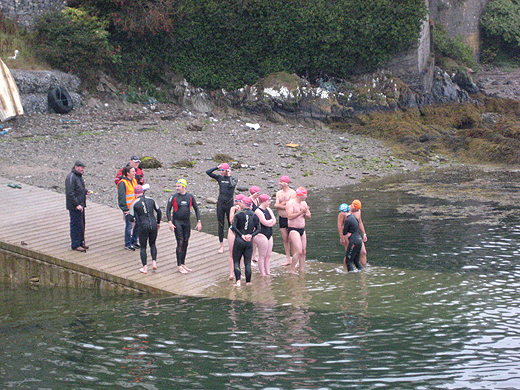
The swim was organised by the Munster Open Water Swimming Organisation and they travelled from as far as Limerick in the west to Waterford in the east and places in between. The swimmers ranged in age from 13 to 65 years. They were started in five different groups, at five minute intervals, the
slower starting first and the fastest in the last group. By doing this the field would have tightened up towards the end of the swim. Each group was accompanied by kayakers for the entire swim. The organisers had two ribs in the area also. The Ballycotton RNLI all weather lifeboat, Austin Lidbury,
kept careful watch over the swimmers in the middle of Ballycotton Bay and their boarding boat, with two lifeboat crewmembers aboard, moved throughout the entire route.
There was a sprint for the finish between two swimmers, who completed the course in 50 minutes. The camaraderie among the group was infectious and the many onlookers felt involved. Having swum the 3.5 km course they then waited on the Ballycotton lifeboat slip for the other contestants to finish.
One of the organisers, Carol Cashell, explained that all entrants had to have swum a 3 km open water competition previously to qualify. She related that the swimmers enjoy the freedom of swimming long distances in the open water. Carol confirmed 32 did this swim last year, when they successfully
swam around Ballycotton lighthouse, 6 have swum the English Channel, 6 have done the Straits of Gibraltar and 2 have swum around Manhattan Island in the US. When asked about the weather conditions and how they affected the swimmers she explained that they don't particularly like the sunny days as this blinds them. They would have been happy enough with the misty evening they were faced with. However, by the end of the swim the sun shone on this harty group.
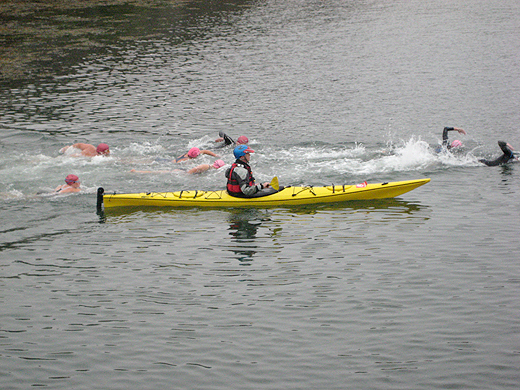
This event was a fundraising effort for Ballycotton RNLI lifeboat. Initially an email was sent to 150 swimmers listed on the Sandycove mailing list. By the morning of the event, Friday 19 August, 45 swimmers, 14 kayakers and 2 ribs had volunteered their time and energy to help raise funds for our lifeboat service. Carol explained that the swimmers have done swims such as this for other lifeboat stations in Co. Cork, e.g. Courtmacsherry, Kinsale, Crosshaven. As a charity the RNLI appreciates
efforts such as this in support of their lifeboats which offers a free service to those in trouble at sea. When the swim was finished and all swimmers had safely completed the course they left with the promise that they would be back again next year.
Two Months To Go Till Galway Ironman
There's less than two months to go till the inaugural Ironman triathlon in Galway.
As reported on Afloat.ie last year, the City of the Tribes was chosen to host Ireland's first ever Ironman 70.3 event on 4 September.
Thirty-five qualifiying slots at the Ironman 70.3 World Championship in Florida are up for grabs in the event, which comprises a 1.9km swim in Galway Bay, a 90km bike ride through Connemara and a 21.1km run through the city streets, finishing at Eyre Square.
Individual registrations are now closed for the race, but some slots are still available with charity teams. For details visit ironmanireland.com.
Organisers of the Focus Ireland Triathlon in Dun Laoghaire on Sunday 31 July have announced a list of road closures in the area, and have also put out a call for volunteers to assist on the day.
Full road closures will be necessary from 7.45am to 11am in the Blackrock, Monkstown and Dun Laoghaire areas. A complete list plus a map of road closures and diversions are available to download below.
Meanwhile, volunteers are required to assist in all aspects of the event. Canoeists and kayakers are especially needed for safety support during the swimming section of the race.
Anyone who has some time to help out on the day, or who can supply canoes or kayaks for the event, is urged to contact events assistant Anne Griffin at [email protected].
Entries are still open for the Focus Ireland Triathlon, which comprises a 750m/350m swim, a 20k cycle and a 5k run. Registration is €80 for individuals/€240 for teams and entries can be made at www.focusireland.ie. For more details call 1850 204 205 or e-mail [email protected].



























